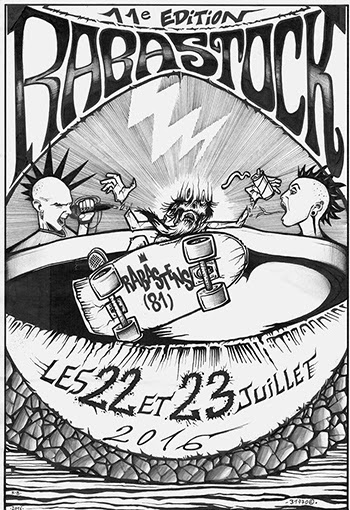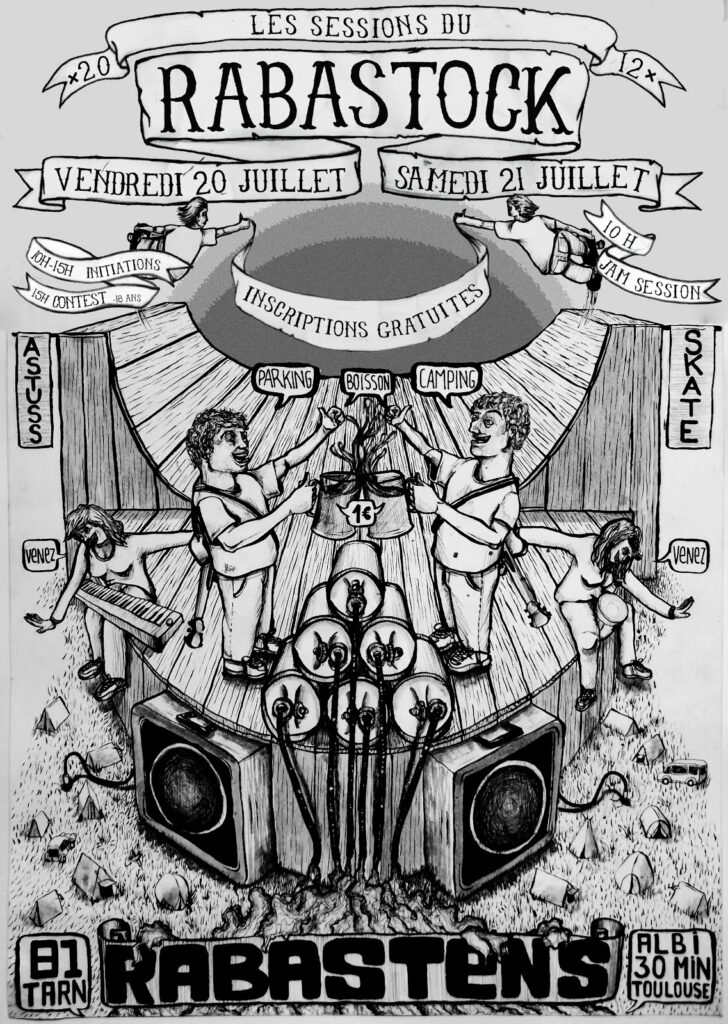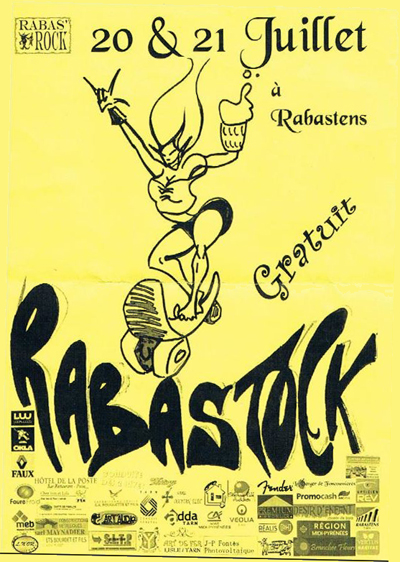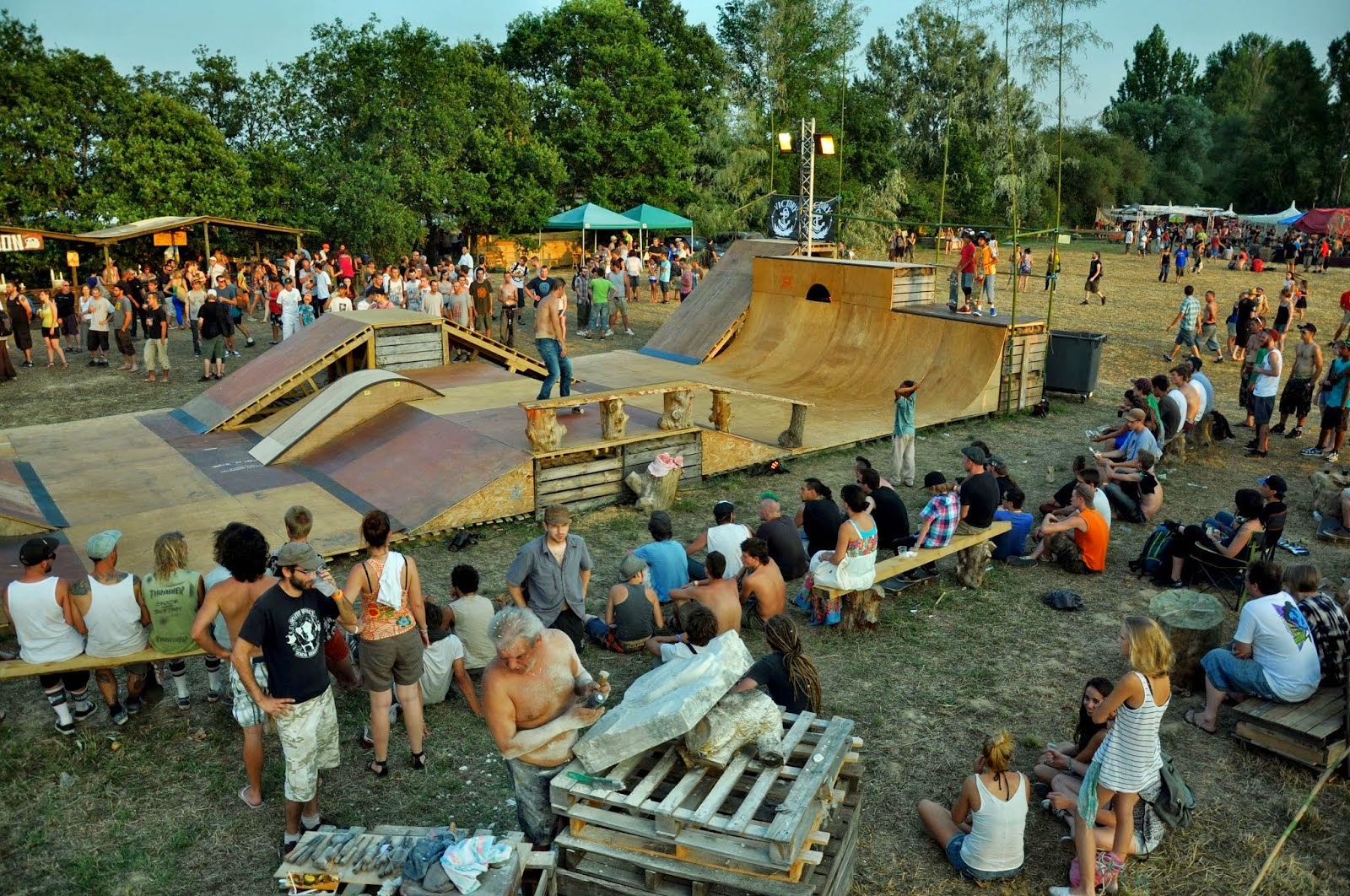RABASTOCK
Rabastock remains the best kept secret from Tarn. Every July, without any communication, 8000 people gather for two days in a field. It’s totally free, congenial and family-friendly. You’re not dreaming, these islands of freedom still exist! The recipe is here: a free entrance, DIY skate ramps, music lives with an unexpected line-up, generous food stands, and a certain idea of living together.
Let’s head straight to Rabastens for an interview with two pillars of the association: Luc and Max.
Interview by Polka B. & Reda | Drawings : Sal Paradise

Can you tell us about the “pre-Rabastock” context?
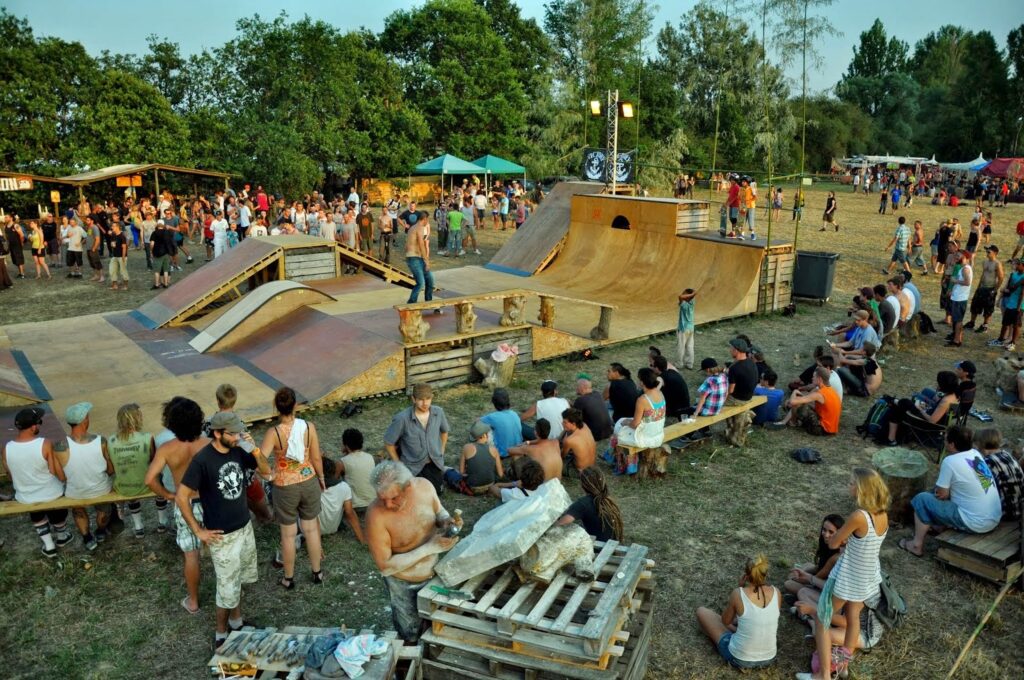
Luc: Wow, that’s a long way back! 18 years ago…
Max: We had a mutual friend named Max. With a lot of farmers’ sons, we gathered in big hangars. They were squatting and rehearsing with their band. But there was nowhere to perform. So, they would organize concerts themselves in orchards. Before setting up the association, they had only done two concerts…
They were a pallet stage, with three packs of beer !
L: The generator was directly connected to tractor power take-offs! You see the thing… Destroy! The name of their band was ODD Hangover. We were all from the same generation. It was this or nothing.
M: Before the very first edition in 2006, it was just a desert…
How were the meetings?
M: It was war. We were supposed to be 15. Most of the time there were 3 of us! Max held the thing…
L: The goal was to always do better.
M: Especially since we were starting from scratch. We used the mistakes of previous years to progress…
L: From the 3rd year, we started to develop the catering side. The bar. With the Astuss association, we arrived around that time to bring the skate aspect. We had made ramps with parquet… and almost set fire to the field with the angle- grinder! Without realizing it, more and more people came to the concert. Like 400 people. For us it was huge!
And in 2010, you welcomed nearly 8,000 people over the weekend! What happened to explode the gauge to this point in such a short time?
M: People spread the word. We even stopped the communication! We couldn’t accommodate more. But the big change was in 2013, when a friend’s father offered us to use his field.
To settle in for free and permanently, to organize on site every year. We were able to invest and build structures that could stay on site. We worked like that until 2019.
L: The problem is that the structures were not up to standard. We had to destroy everything. So no 2019 edition… And then… COVID!
M: In fact, the Mayor was okay with subsidizing us, providing that we comply with the standards. But it was too complicated for us.
So in 2019 and 2020, no Rabastock.
L: What must be said is that for years, everything was in Max’s name. While we were in free mode… And he took all the risks by taking the responsibility on his back. He was in an unconditional thing, without acting like a boss. We owe him a lot. An organization really doesn’t hold on to much… Because when he retired, we found ourselves like idiots!
Are you in a collegial mode of operation?
L: Exactly! We’ve gotten a bit older, we think a little more (Laughs)

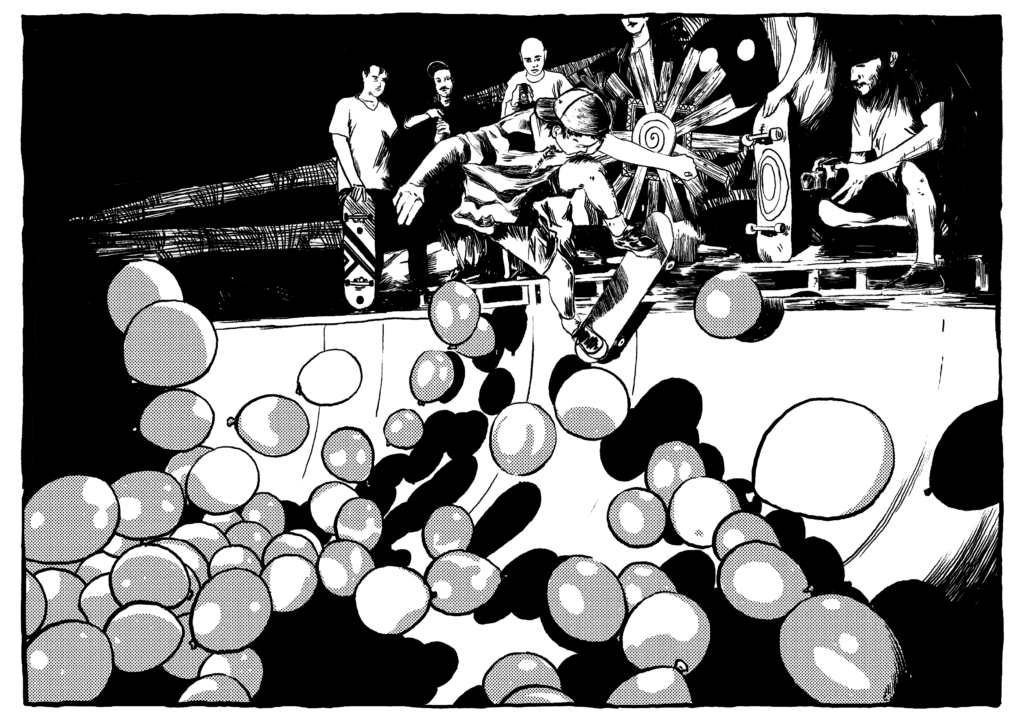
What makes Rabastock so special is that it’s free. Despite the festival’s success, you’ve always been determined to refuse any paying entry. Can you tell us about it?
M: Rabastock is non-profit, especially with regard to the public. That’s been the basic principle since the beginning.
L: We’re a bunch of obstinated people. It would have helped us to at least have a donation entry! But no… For the whole team, it was not possible!
M: On the other hand, it’s the bar and the catering that partly finance the festival’s activity. So the party-goers who sold their beers in the parking lot, that was a problem for us. If it has to be free, you have to play the game!
L: There are no food trucks either. No commercial relationships. In fact, the only thing we tolerate on site is the bands’ merch.
M: In reality, the festival survives mainly thanks to donations throughout the year. It’s people support that allows Rabastock to exist.

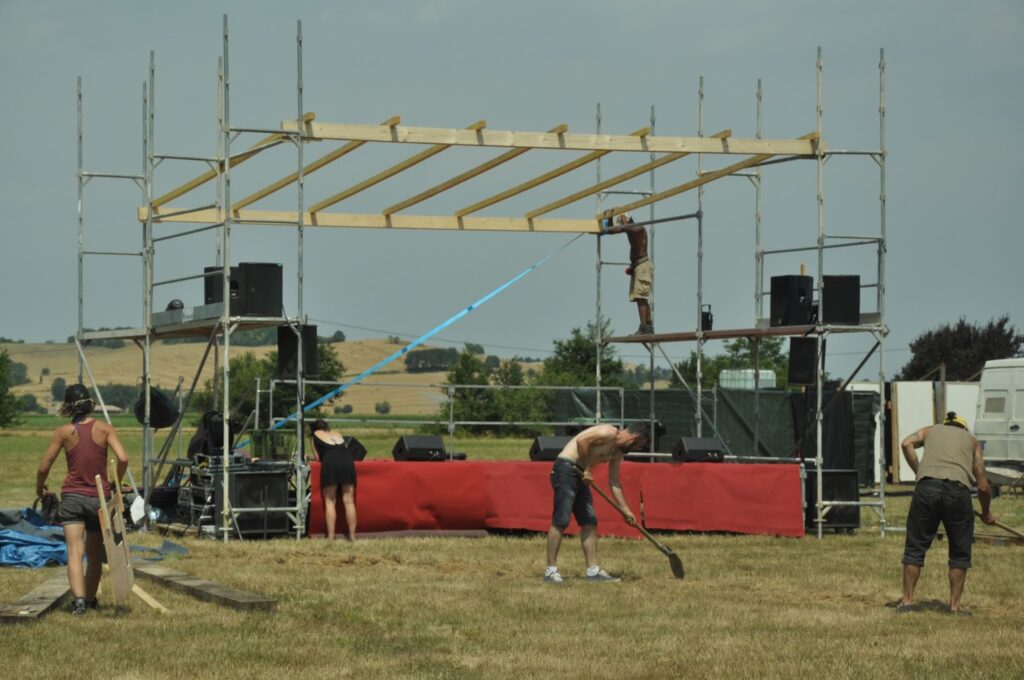

What are the basic principles of Rabastock?
M: Accessibility to all. Operating at low price. Doing things by yourself.
L: We claim this thing from a big popular party where people gathers. With several generations, skaters, rugby players… It’s normal life. We have to live together even though our differences. It’s also the reality of the countryside.
M: And for that, food is central. It brings people together. Our army of cooks has proven itself. All the village come to eat! No matter the program. We see grandpas… everyone! They don’t necessarily stay for the concerts, but at least they come!
L: My neighbor is 70 years old. He has nothing to do with us. But he finally came this year! He told me: “It was good but… there were incredible people! Boys dressed like girls, topless girls… I thought that hadn’t existed since the hippies!! It was great!”. He was shocked but he found it cool! The guy came out of his house and he loved it. That’s what we want.
Have you ever thought about giving up? What motivated you to come back to organize a new edition in 2021?
L: Giving up also means destroying bonds. It’s the cement of our group. Drinking beers is not enough. We want to do things together, take on this big challenge! We’re into action. So if there’s not more of that…
M: It’s like a music band! Except we only have one concert a year (Laughs). Rabastock is a central thing in my life. I made it my job. I started setting up dry toilets and ended up as a stage manager.
L: It’s a lot of work, but it’s totally parcticable. Anyway, we’re all alone here! We go and we don’t care. We’re totally uninhibited.
M: To be more fun, we forced ourselves to be more serious. To do things right.
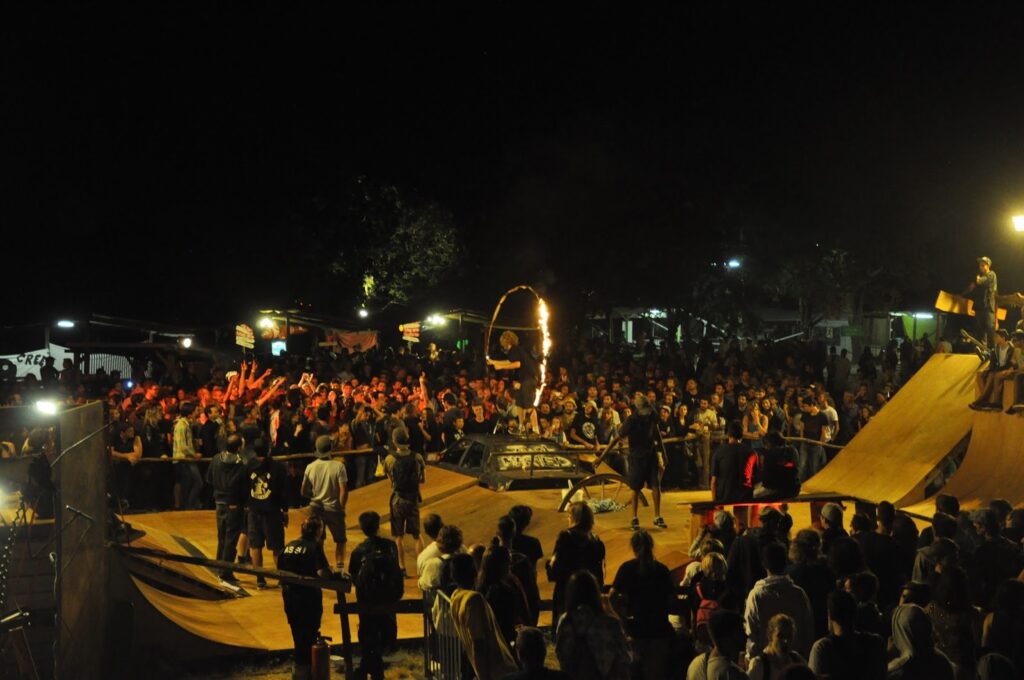
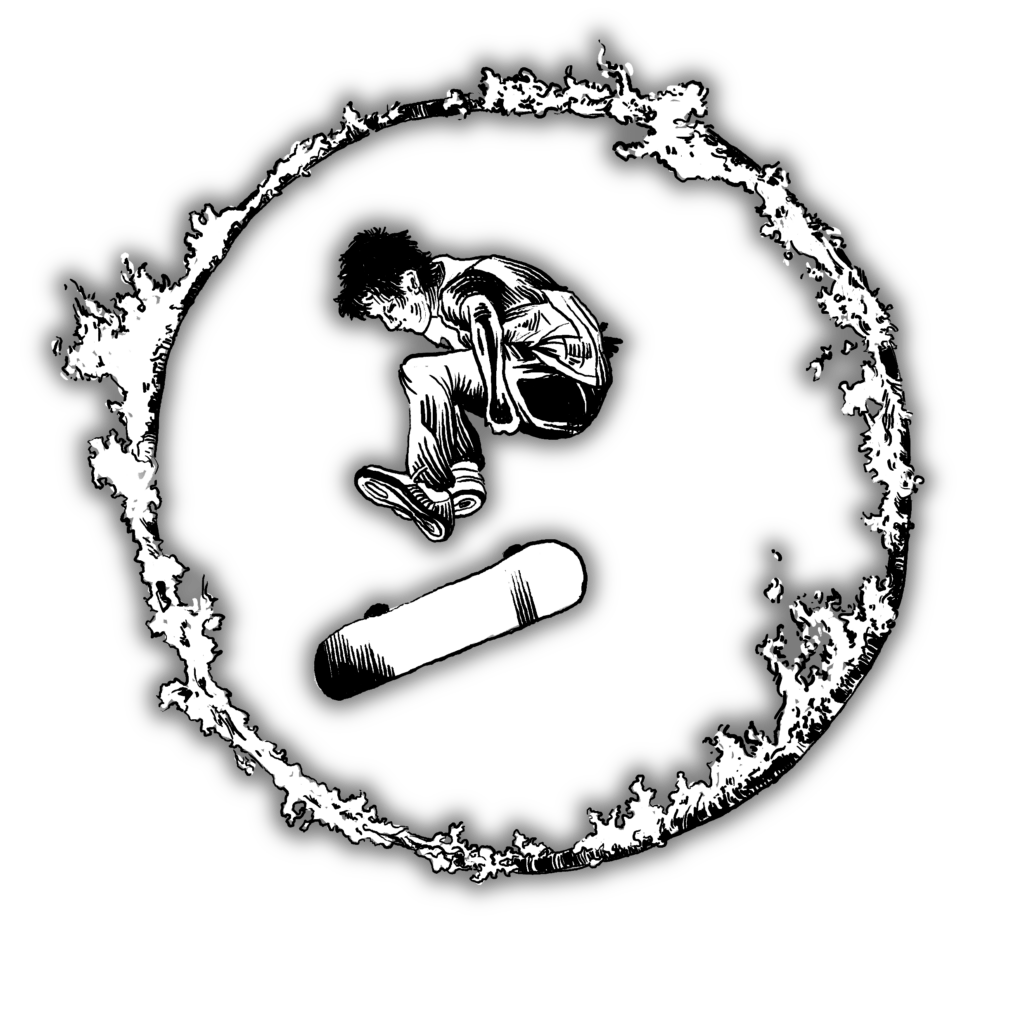
On the skateboarding aspect, did you have an example? It’s quite unusual to make your own ramps in a music festival!
L: We were reading Trasher magazine. We were also watching VHS tapes from the early 2000s. The Americans were already mixing skate and punk concerts. It wasn’t an example but I think that unconsciously, it influenced us.
I think above all that we didn’t have time to think about subsidies. We were a group of skaters. We were rubbish, we didn’t know how to make good modules, but we were keen. We had the time and motivation! We had to do it, here and now.
We haven’t talked that much about the lineup! How do you choose the bands?
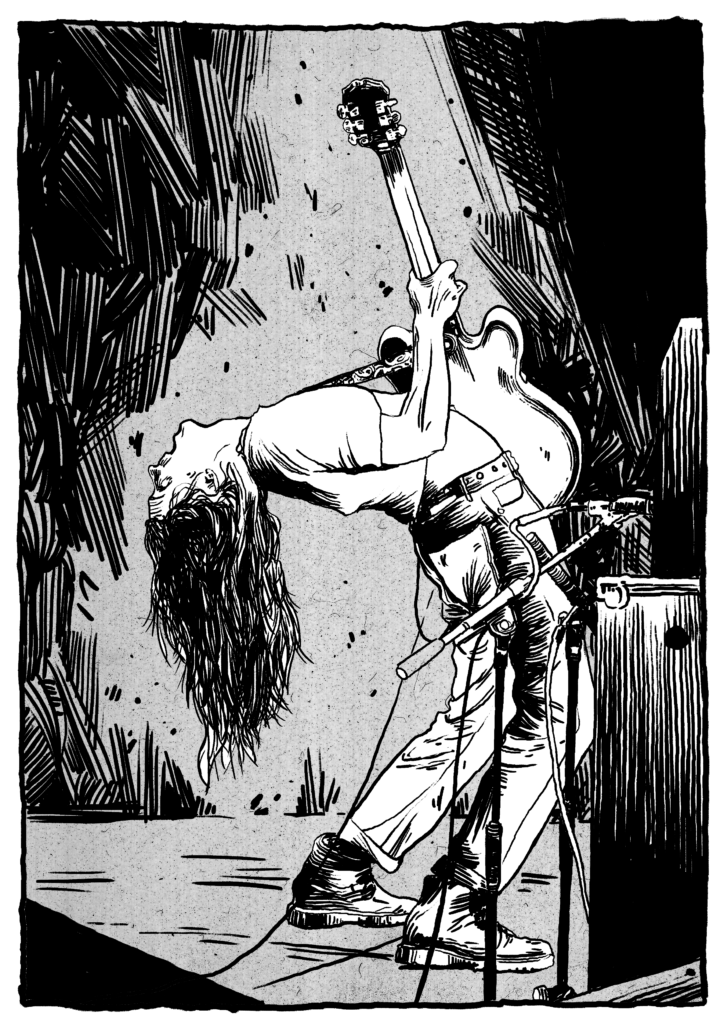
M: It never stopped evolving. At first editions we all decided together. But it was a pure hell. We had shitty tastes!
L: I got used to programming the skate stage. And we ended up dedicating the lineup of the “main” stage to fewer people. You have to trust! But it was always changing. For the spirit of the lineup, I have a simple vision: the big festivals all program more or less the same bands. At Rabastock the festival is free! So let’s create a surprise without falling into experimental stuff. Basically: we want to bring in surprising bands that remains accesible. Amazing bands exist, we must seize this opportunity.
M: Without forgetting the budgetary constraint! (Laughs)
L: This year: €3,500 of budget for 20 groups! Can you beat that?
Can you tell us an anecdote that marked you within the festival?
M: Oh yes! The best after-festival item we found: an electric wheelchair! In a ditch!
L: It’s worth a fortune and it’s really heavy!
M: The guy took over a week to contact us to get it back. In fact, he came from Rabastens. He was drunk and his friends brought him back at the end of the evening. Leaving the wheelchair there…
L: And 2016: the year of the storm! The concerts had taken place after a crazy apocalypse. People thought they were going home, and they still had to go through the concerts in liters and liters of mud!

How do you see the future for the festival? Do you want it to grow?
M: No! 8000 people over the weekend is the maximum. We absolutely do not want to grow. It’s very good like that.
